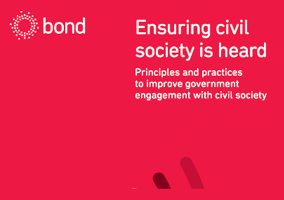In England at least, seeking to influence government policy feels quite unfashionable as a route through which civil society might bring about positive change. The log-jamming-merry-go-round of parliament doesn’t look like a place where new legislation will be considered or passed. The metropolitan shock of the referendum, the long grind of austerity, institutional failures on diversity and equality, and the climate crisis, have rightly had the usual suspects paying rather more attention to a broader canvas of communities, geographies and movements.
That said, the laws of the country and the policies of the government (and potential future governments) remain crucial levers for civil society to pull, push and provoke in pursuit of charitable goals and other progressive aims. Changes such as the smoking ban, plastic bag tax and Climate Change Act demonstrate that on many issues laws can have a reach and breadth and public benefit that can’t be achieved by any amount of education, advice or voluntary initiatives.
In recent years, discussions about the relationship between civil society and government has tended to focus on the legitimacy and regulation of civil society influencing. References to ‘chilling’, ‘knitting’ and 'gagging' will be familiar to anyone who has followed this debate. If nothing else, practically everyone (here, here, here and here) agrees that the regulatory spaghetti of electoral law is desperately in need of an overhaul for the digital age, and that the way it applies to civil society could be improved.
Less attention has been given to what successful civil society engagement with policy making now looks like. What are the challenges faced by civil society organisations looking to engage government? How can government better utilise the expertise of civil society organisations? How can civil society organisations make it easier for government to engage with them? How and when do opportunities to influence policymaking arise?
To help explore these questions, JRCT convened a small seminar last autumn at the Institute for Government. The participants included politicians and officials, and individuals with experience in both government and civil society organisations. The event was held under the Chatham House rule. Four main themes emerged in the conversation, and each of these is explored below.
What: Evidence of many kinds
One participant noted that civil society groups may assume levels of knowledge in Whitehall that just aren’t there. The strength of civil servants involved in policy making tends to be in rapidly accessing and analysing existing information from external sources, while institutional memory and subject matter expertise are often patchy.
This obviously provides an opportunity to external actors who wish to inform or influence policy processes. However, more than one participant felt that civil society organisations – and particularly smaller charities - produce a lot of research and policy proposals that are too long, poorly targeted, or simply not of a high enough standard to be relied on as evidence.
Participants also recognised that some kinds of evidence are not best communicated by written reports. Good policy making requires - amongst other factors - good external engagement with a range of stakeholders. Innovative forms of engagement that bring together decision makers with practitioners and citizens are needed.
Another participant noted that stories, anecdotes and vignettes are a really helpful means of exerting influence, particularly on politicians. The power of emotional evidence and the framing of evidence in ways that appeal should not be understated.
Who: Coalitions and contacts
As Kissinger definitely didn’t say, “Who do I call when I want to speak to civil society?” There was a marked preference amongst civil servants present at the discussion for coalitions of civil society groups speaking with a single voice and they were able to give examples of when this had worked well. There was also some real frustration expressed at the number of different civil society interest groups fighting for the attention of a small number of officials, and the difficulty of getting a clear picture of the field.
Those who have worked within civil society saw more inherent value in diversity, and also have experienced the costs and frustrations of coalition building. Nevertheless, there was a recognition that a strong common approach is powerful, provided that it is sufficiently rooted in and informed by a broader movement. Such coalitions can be even more powerful if they stretch beyond traditional civil society, bringing in private sector voices or other actors, although this may raise further issues of compromise and co-ordination.
Personal contacts and relationships matter, and policy makers will often rely on those they know and trust. Opportunities that enable the range of relationships to be broadened, while working within the limited capacity of busy officials and busy charities, are very valuable for all concerned.
When: Luck and opportunism
As previous Institute of Government work amply illustrates, policy making is a messy, non-linear process.
For civil society, and perhaps even more so for civil society funders, there is a need to recognise that good advocacy requires the thorough development of robust solutions (even when the immediate policy context looks unconducive) and the capacity and ability to respond quickly to events and opportunities when they arise. This chimes with the renewed interest amongst funders in providing core and flexible funding. Civil society should not wait to be invited to engage, but nor can civil society control the policy process; instead, civil society needs to be preparing and building a case ready for seizing the moment when an opportunity for influence arises.
One participant gave an interesting example of a high-profile media story that opened up space both for the government and civil society organisations to push for action on a topic that was largely unrelated in policy terms, but that connected for the general public. Other participants noted the risk of over-estimating the importance of individual news stories, and the value of a strong strategic narrative that is pursued consistently over time.
Who else? Politics and interests
Policy making is not just a technical process. It is also shaped by the power and agendas of different actors, including individual ministers, the political parties of government and opposition, and a range of private and public sector organisations - as well as civil society. Charities working for the public benefit need to be clear sighted about commercial or political interests that may be pushing in other directions.
The increasing power of select committees in the policy process is widely recognised. Some participants also saw these committees as moving away from a more neutral scrutiny role to becoming campaigning vehicles, often shaped by a strong chair (see also here and here for more analysis). There are opportunities for civil society to inform, support and benefit from this trend, though they also need to keep their own independence.
Finally, participants recognised that civil society has its own power dynamics, with competition for resources and influence, the different strengths of large and small charities, and conflicting policy positions. Some organisations see their role as to engage with existing policy, whereas others seek more structural or disruptive change. Charities, funders, policy makers and the media can all favour ‘heroic individuals’ (who are often – though not always - white, male and university educated) over organisations and networks. We need to be alert to different forms of power, and how the business of change-making is changing.
Nick Perks is the trust secretary at the Joseph Rowntree Charitable Trust
|
Related articles











